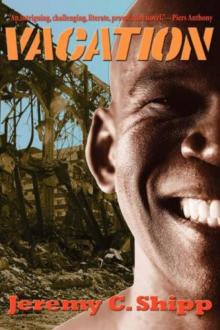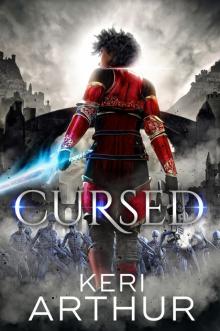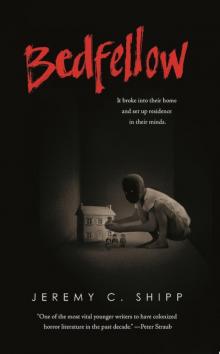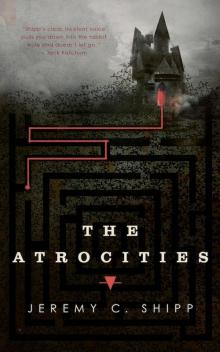- Home
- Jeremy C. Shipp
The Atrocities Page 3
The Atrocities Read online
Page 3
We eat in silence for a few moments. The rash on the back of my hand has devolved from an amoeba into a tiny red dot.
Raul clears his throat and says, “Sometimes I hear voices in the hedge. Always near the Atrocities.”
Robin points her knife at the gardener. “Be serious, Raul.”
“I am,” he says, staring at his gazpacho. “The sound is so quiet, though, I’m never sure what I’m hearing. It could be my mind is misinterpreting the wind in the leaves.”
“Ah,” Robin says. “Might be we’ll never find out the truth about Isabella, but it breaks my heart to think of such a sweet girl trapped here in the physical realm. I’ll ask you, miss, if an innocent girl doesn’t deserve her time in heaven, then who does? On numerous occasions, I’ve told Mrs. Evers about the mediums from the television. I’m sure there are countless frauds out there, but these particular psychics are most impressive, I can tell you that much, miss. I’m confident Mr. Evers could hire one of these women to fly here and help poor Isabella, but Mrs. Evers says that Isabella isn’t ready to cross over. I suppose Mrs. Evers knows best when it comes to her own daughter.”
I can’t think of how to respond to Robin’s words, so I eat the cold, dead grouper in silence.
* * *
Isabella refuses to join us in the classroom this afternoon, so Mrs. Evers takes me by the hand and leads me to the garden behind the house. Outside, we travel a pebble-mosaic walkway with an intricate pattern of white flowers and human-faced insects.
“This way,” she says. Her hand feels small and cold.
We pass through a number of rose-covered arches before coming to an open area bursting with creeping phlox, anise hyssops, and other flowers in shades of red and purple. Prismatic butterflies dance across the sky and quiver over glistening petals.
Mrs. Evers pulls me toward a wrought-iron bench with a spiral design. A wide, metal eye nests in the center of each spiral. Nearby, a marble warrior rides a human-faced bumblebee, raising an elongated arm, pointing a spear at the sky. Water rushes from the tip of his weapon into the fountain’s octagonal base.
Mrs. Evers motions for me to sit on the bench, but she doesn’t join me. Instead, she stands in front of the fountain, biting at a fingernail. A monarch butterfly hovers near her braided bun.
“I’m so sorry for the inconvenience,” Mrs. Evers says. “Ordinarily, Bell will follow me when I find her. But right now, she refuses to leave the bench.”
“I don’t mind,” I say. “It’s beautiful out here.”
“It is. Yes.”
At the far end of the garden, Raul stabs at the ground with his knife, again and again. He wipes his face with a red handkerchief. For a moment, the fabric appears like an open gash across his neck.
“Well,” Mrs. Ever says, “I hate to lock myself inside on such a beautiful day, but I have work to do. I’ll leave you to your lessons.”
She heads for the mosaic path, but I say, “Wait. Mrs. Evers. Could I speak with you for a moment?”
The woman faces me again, her pale eyes narrowing in the sunlight. “Yes?”
“Mrs. Evers, I want you to know . . . If you ever need someone to talk to, I’m here. I’m no therapist, but I know what it’s like to lose a child.”
“I haven’t lost her,” Mrs. Ever says, the words rushing out of her like a savage river. “She’s sitting right beside you, clear as day.” She touches the side of her face with curled fingers. “But I . . . I know what you mean. Things have certainly changed between Bell and me. Much has been . . . lost.”
“I’m so sorry.”
Mrs. Evers sits at the edge of the fountain, and I join her. She dips a fingertip into the water and circles a cerulean petal. “She opens her mouth sometimes, as if to speak to me. But she can’t. I’m sure it’s terribly frustrating for her. She can sometimes nod yes and shake her head no, but that seems to be the extent of her abilities. I’ve tried teaching her some sign language. I bought a book. But her fingers, they seem stuck together like a doll’s. She can’t . . .”
Mrs. Evers pushes the petal into the water, and I can hear Raul stabbing at the ground again. He sounds closer to us now.
I place my hand on Mrs. Evers’s back, but only for a moment.
“I wish Bell would leave the garden.” She stands and faces the bench. “Come inside, Bell. Please?”
The fountain alone gurgles a cryptic reply.
Mrs. Evers speaks again, too quietly for me to hear, and walks away without another glance in my direction.
I sit at the bench, in the cool shadow of a jacaranda tree. My woven satchel leans against my ankle, but I left all my folders back in the classroom. I kick off my shoes. An electric blue butterfly spirals from above onto my foot and lies flat on my flesh. No. That’s only a petal.
I look up, and a creature with a long hairy face scrambles out of the fountain. The giant guinea pig rushes in my direction, dragging a wet, wilted tutu under its belly. I know I should run, but my body freezes. A little voice whispers that this is the stuffed animal from the hallway come to life.
Out of nowhere, Raul materializes and grabs a pink harness on the creature’s back.
“How is it that you keep escaping?” the gardener asks, and then looks at me. “I have a sneaking suspicion that she’s learned how to pick locks.”
“Maybe she’s training to become an escape artist?”
“Maybe.” The gardener’s grin fades a little. “Honestly, though, I think she’s looking for Isabella. The two of them were close. As close as a girl and her pet capybara can get, anyway.”
Raul releases his grip on the harness as the creature grazes on the grass. She chirps with glee and wiggles her tiny ears.
“Can I pet her?” I ask.
“She’s been a bit bitey lately. Stay away from her face, though, and you’ll be fine.”
“Never mind.”
For a short time, we watch the capybara in silence. Her tutu dries out in the sun and expands like a blooming pink flower.
“I suppose I should get her back to the enclosure,” Raul says. “Come on, Princess.”
We say goodbye, and Raul jogs toward the side of the house, weaving around tufts of scarlet monkeyflowers and heartleaf milkweeds. The rodent trots along beside him, warbling away. I watch them until they become smears of earth-tone colors in the distance.
I take a deep breath. Another.
Years ago, I wasn’t the kind of person who would sit and search the air for butterflies and wiggle her toes in the soft grass. But here I am. After years of practice, these halcyon moments in a natural setting feel almost natural. Of course I still suffer a faint nausea of guilt, like a cat’s gentle kneading on my stomach. Why should I enjoy the sun on my skin when Bruno and Isabella can’t?
I take another deep breath.
Then I reach out and touch the air beside me on the bench, but I don’t feel a thing.
* * *
I skip dinner because of a headache that brings to mind two beetles hugging the backs of my eyes with strong, wiry legs. In my room, Robin serves me a cup of soup with pink spirals floating on the surface. I thank her, and as soon as she’s gone, I pour the noodles into the toilet. I can’t have food near me right now. Even the faint doughy smell still clinging to the air is getting to me.
In bed, I arrange five novels on the silk charmeuse blanket. I inspect the covers carefully, as if I’m reading Tarot cards for my future. One illustration shows a ring of moss-coated standing stones with a hole in the center. There’s a man in a straw hat attempting to pull himself out of the darkness, or is he lowering himself inside? Another illustration shows a woman peering through a window marred with spidery cracks. Her nude body appears shattered to pieces. Why is she smiling?
Before I can decide on a book, I’m sliding into a room with jaundiced walls and oxidized metal beds. Flecks of glittering dust swirl in the air like a swarm of gnats, only to settle on the tile floor a moment later.
The mouths in the walls open and
close, open and close. They reveal black, broken teeth that remind me of a shelf in my old house decorated with volcanic glass. Someone collected these shimmering rocks. I can’t remember who.
The mouths wheeze and groan. Grublike tongues poke out, quivering, licking the chapped lips. I can tell the mouths are hungry, but there isn’t a food tray to be seen. The mouths moan even louder, like dying animals. At this point, I begin pulling the brass handles on the floor tiles, opening little doors. One door reveals a dark tunnel that blasts a stream of sour air into my face. This must lead to a mountain of used syringes and bloody bandages and discarded body parts down below the hospital. For a moment, I can see pale serpents interlacing their bodies throughout the refuse. Their humanlike faces grin up at me.
Another opening in the floor shows me a man in a gray checked suit sitting on the toilet.
“I’m so sorry,” I say, and as soon as I speak, the man’s whole body lurches as if struck by lightning. He can obviously hear me, but he makes no attempt to acknowledge my apology. His downcast eyes don’t shift from the fishing magazine on his lap. He licks his finger and flips past page after page of decomposing swordfish and sharks and mackerels. The fish stare up at me with wide open eyes and wide open mouths. Maybe I shouldn’t be opening random doors in the floor, but that’s no excuse for this man to ignore my existence.
“I said I’m sorry.”
The man’s body lurches again, only this time he falls over. His body flounders on the grimy floor, and sparkling dust erupts from his mouth. I shut the door quickly as my heart squirms in my chest.
In the next floor compartment, I find a small shoebox packed with hamburger meat. Smiling, I scoop up two handfuls and approach the nearest mouth in the wall.
“Here you go,” I say, keeping my hand flat, as if I’m feeding one of my cousin’s horses.
He gulps down the raw meat with a sort of fierce desperation. Soon, grunts of pleasure replace his agonized moans. When I run out of hamburger, his slimy tongue wiggles on my palm, searching for more.
“That’s enough for now,” I say.
The mouth clacks his fractured teeth at me in annoyance.
I feed another, and another. In time, the satiated mouths begin singing in guttural, sepulchral tones. I can feel the music on my skin, mimicking the sensation of a hot bath after a late-night walk. My heart twirls. The shimmering blue dust bounces on the floor.
A man in a white lab coat seems to materialize out of nowhere, but I know that can’t be true. He snaps his fingers at the mouths, quieting them. Clusters of pink scabs form a Rorschach test on his wide forehead. In the dry crust of flesh, I see two dogs facing each other, baring their teeth.
“We need you on the table,” the man says.
“I can’t right now,” I say. “Some of them are still hungry.”
“They’re not your concern.” The man’s voice sounds gentle, but I can see the grimace behind his diaphanous surgical mask. Flakes of skin detach from his face and drift to the floor like roseate snow. The Rorschach test now shows two old men with their heads twisted completely around. They reach for each other, but their bonelike fingers don’t quite touch.
“Please lie down,” the doctor says, pointing to the nearest bed with a scalpel. I have a sudden feeling that he’s cut me before. And I’m afraid that he cut a piece out of me that I needed.
Taking a step back, I say, “I need to reschedule this procedure.”
The man shakes his head, causing the Rorschach test to shift again. This time, I don’t see a picture. I see only flesh, scabrous and peeling. “We can’t wait anymore,” he says, pulling me by the wrist. Only now do I notice that my hands are covered with blood from the hamburger meat. I hold my free hand as far away from the rest of my body as possible.
“I need to feed them,” I say. “Let me go!”
But there is no escape from the man’s marble fingers. Soon, he lifts me high above his head and slams me onto the metal table. The room trembles. Pale serpents rise from the floor, grinning with their human lips, and they interlace their bodies throughout my own limbs.
The mouths in the wall join me in a chorus of screams.
When I wake up, I can feel the blood, thick and slippery, coating my entire body. No, this is only sweat. The moonlight pushing through the stained-glass desertscape gives my skin a faint indigo glow.
I sit up in bed and inspect my body. I’m still wearing the pajamas with swing-dancing Maine Coons and trumpet-playing Scottish Folds. I must be awake.
When someone or something knocks on my door, my heart lurches like the startled man on the toilet. I imagine the doctor bursting into my room, pointing his scalpel at my face, his forehead crumbling. No, I’m awake now. This is real.
As I begin wriggling off the bed, my head feels studded with tacks.
“Hello?” I say.
The response comes in the form of a shrill giggle. Someone hammers on my door again, and I know I should hurry so the culprit doesn’t have time to escape. But for a few moments, I stand frozen in the darkness, hugging my torso. I imagine a girl with big brown eyes and an impish smile. A crown of lavender flowers sits askew on her dark curls, and I can see through her phosphorescent face. There’s a gaping wound on her chest that will never stop bleeding.
I open the door.
Instead of a girl, I find a small mound of squirming black rats. Another piercing cackle echoes in the hallway, but this one sounds faraway. I shut the door, and as I hurry in the opposite direction, I accidentally slam my knee into the bedside table. “Shit, shit, shit.”
After turning on the Tiffany-style lamp, I grab my phone and activate the flashlight app. My heart won’t stop throwing itself against my chest, like some crazed caged animal. With the door barely ajar, I shine a slice of light onto the rodents outside. This time, they’re not writhing and flicking their tails. This time, they’re only toys. They sit one on top of the other, some of the rats upside down, forming a chaotic pyramid. Their beady black eyes twinkle in the light of my phone.
I remember crawling across the orange-and-brown shag carpeting of my parents’ bedroom. I remember meowing, and my parents would say, “Go to bed, baby.” And I would say, “I’m not a baby. I’m a kitten.” Sometimes, I would look over at the piles of laundry on their floor, and the shirts and pants seemed to wiggle slightly in the darkness, as if alive. The sight of the dancing laundry never bothered me, because even as a child I knew this was only a trick of the light. A trick of my mind.
After toppling the plastic rats with a gentle kick, I scan the hallway.
“Hello?” I say again.
Cacophonous barks of laughter lead me limping away from my doorway. I glance back once, to make sure the rats are still only toys. They are.
I move on. Brass fixtures perch above the hall paintings like slumbering birds, irradiating the angels with amber light. Eventually I come across one such painted figure with blood overflowing from her mouth and dripping down her bony chin. When I get closer, I can tell from the scent that the blood is actually ketchup. Farther down the hall, there’s an angel with ketchup covering her eyes, bloody tears running down her hollow cheeks.
Someone in this house is playing a sick game, and I need to find out who. Whoever this person is may have convinced Mrs. Evers that Isabella is a ghost. This needs to end now. For my sake, and for Mrs. Evers’s. With these thoughts swimming in my tack-studded mind, I move on, limping, shining my Android into the blackness ahead.
I follow the path of hemorrhaging angels to a pair of white faces resting on the terracotta floor. Someone seems to have shattered the ceramic faces and pieced them back together haphazardly. Looking closer, I notice that the man’s nose is upside down. And the woman’s missing eye is sitting on the man’s forehead.
Haven’t I seen these faces before?
Yes, these are the scowling visages from the urns on the mantelpiece. Moving forward, I notice what could be a trail of dust, or human ashes. I follow this sinuous trail throug
h narrow corridors lined with lace-covered windows. The ashes lead me to another ceramic face on the floor. This one is missing both eyes, and ketchup covers her lips and cheeks. A stuffed porcupine wears the ceramic face like a mask.
“Hello?” I say, to the empty hall.
Minutes later, I come to a doorway. I suppose part of me knew the ashes would deliver me here, to Isabella’s room. Black-light tubes on the ceiling shine on the drawings of squirrels and gophers and beavers. The animals glimmer in fluorescent violet and deep blue. I search for a light switch near the doorway, but I can’t find one.
Suddenly, I hear a small voice whispering in the direction of the miniature cottage. I point my light at the playhouse, but I can’t see anyone. The little door is closed.
“Who’s there?” I ask.
The only response is more whispering and half-suppressed giggles.
I make my way across the room, careful not to touch any of the books or plastic animals, as if they might be booby-trapped. Once, I almost slip on an oversized pencil, and I gasp overdramatically. Angry-looking symbols ooze down the playhouse door, written in ketchup.
As I step closer, a memory drifts inside me of my father sniffing the floorboards, saying, “It smells like death down there.” And then I followed him outside and watched as he slowly unscrewed the metal vent of the crawlspace. I pictured a child lying under the house, her arms crossed over her chest, her whole body covered with worms. What my father pulled out was a stiff-legged possum.

 Vacation
Vacation Cursed
Cursed Bedfellow
Bedfellow The Atrocities
The Atrocities Sheep and Wolves
Sheep and Wolves